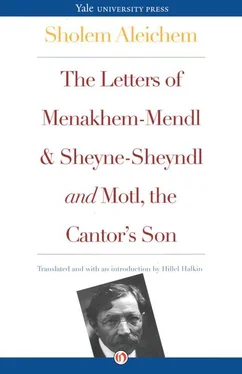The same accusation of being narratively static has also been leveled against Tevye and Motl, the forward movement of which, too, seems at times to be obstructed by repetitive patterns of plot, language, and behavior. Nor, inasmuch as Sholem Aleichem could not have written as voluminously as he did without occasionally resorting to such stratagems, is the charge wholly without merit. Ultimately, though, it is unjustified. Menakhem-Mendl, certainly, does change in the course of his letters, which span several years. (We can gauge the passing of time in them by the age of his son Moyshe-Hirshele, who is barely speaking in Chapter 2 and already learning to read in Chapter 4.) Although he may struggle to sound as jaunty in the last paragraph of his last letter as he does in the first paragraph of his first, his desperation grows perceptibly greater all the time. The man who writes to his wife in Chapter 6, after being bamboozled by a transparent insurance scam, “But it’s as your mother says: once a loser, always a loser,” is not the same man who wrote in Chapter 2, following the dive taken by his stocks, “When all is said and done, you see, I know the market inside and out…. Brains, praise God, I have as much of as any investor.” His self-confidence and self-respect (more precisely, the facade of them, since at bottom he has none to begin with) have been badly eroded.
As for Sheyne-Sheyndl, even if we do not interpret her silence in Chapters 5 and 6 as a decision to stop writing her husband (there is after all a more practical explanation: he is on the road and she has no address for him), we see her attitude toward him shift from semi-credulous hope to furious impatience and thence to open contempt. Like him, she still begins and ends her letters with the same rote formulas (real features of traditional Yiddish epistolary style that are comically contrasted by Sholem Aleichem with the actual content that they frame), but her belief in him, and in the prospect of his ever supporting their family, steadily shrinks.
The Israeli scholar Abraham Novershtern has written an essay pointing out, not only how rigorously Sholem Aleichem weighed the contents of the 1910 edition from a literary point of view, but how, in editing and arranging them, he gave them a dramatic structure that might be described (the image is mine) as funnel-shaped, since the more Menakhem-Mendl slides downward, the more his horizons close in on him. [11] Avraham Novershtern, “Menahem-Mendl le-Shalom Aleikhem: beyn toldotha-tekstle-mivnehha-yetsirah,” Tarbiz 54 (1985), pp. 105–146.
Starting out in the cosmopolitan port city of Odessa, where he dreams of making millions in the futures market, he next unsuccessfully buys and sells shares in more provincial Kiev; then flops as a middleman working on commission; then fails as a writer, a “respectable profession,” as he puts it, but one that pays paltry sums; then, returning to small-town Ukraine, is made a fool of in the once but no longer reputable occupation of matchmaker; and finally is hoodwinked while peddling insurance in Bessarabia, a rural boondocks near the Rumanian border that makes Kasrilevke seem the center of the world. He has ended up considerably behind his starting point, and the lower the bar is set each time, the more crushing is his failure to clear it. What is left to try but America?
Although it would have been possible for Sholem Aleichem to readress Menakhem-Mendl’s 1903–1904 letters from New York to Sheyne-Sheyndl also, thus adding a seventh, American chapter to the 1910 edition, he had good reasons for not doing so. Between 1904 and 1910 he had been in America himself, and despite his personal disappointments there, he had seen what a land of opportunity for its Jewish immigrants it was. Even in 1903, he had had Menakhem-Mendl comment on the fundamental economic difference between the United States and Russia. On the one hand, writes Menakhem-Mendl, the immigrant to America takes any work, does things no one would dream of doing back home; why, he relates, he has just met a man, a respected Jew in the Old Country, who is proud to have found a job sorting dirty underwear in a laundry! Yet on the other hand, in America even a menial job like this pays well enough for a man to save — Menakhem-Mendl uses the Yiddishized English word onseyvn —and get ahead. Ot vos heyst a gebentsht land, “Now that’s what I call a blessed land,” he concludes in a tone midway between irony and amazement. [12] “Adieu: Der letster briv fun Menakhem-Mendlen,” Menakhem-Mendl (New York — Varshe — Vin — Yehupetz), pp. 31–32.
Of course, one can be a Menakhem-Mendl in America, too, but with a difference, for here one’s failures are purely personal and in no way reflect the general condition. Even were he less of a shlemiel, Menakhem-Mendl could get nowhere in Russia, because there is no such thing there as upward mobility; he is indeed the stymied symbol of his class that the Marxist critics make him out to be, and his fantasies are his only alternative to accepting this. But who is to say what is fantasy in America? Ordinary people do make money there on the stock market, since it is not just a game for suckers, and Menakhem-Mendl’s harebrained scheme of a super-efficient chain of matchmaking bureaus with a centralized list of customers is harebrained only in Yehupetz. In America, with the help of an affordable bank loan, it just might work.
Menakhem-Mendl must therefore never make it to America, for whether he fails or succeeds there (and in his letters from New York he does succeed, launching the journalist’s career that eluded him in Yehupetz and that he is later to pursue in Warsaw), he either goes on being himself and ceases to be an archetype or becomes a new archetype and ceases to be himself. To be both the archetypal Jewish immigrant to America and himself, Sholem Aleichem had to invent someone else: Motl, Peysi the cantor’s son.
The “sunniest” of Sholem Aleichem’s major works, as it has been called, one in which the characteristically rambling, anxious voice of his protagonists yields to the direct speech of a high-spirited child, Motl, the Cantor’s Son has a simpler publishing history than Menakhem-Mendl; it too, however, bears the author’s typical stamp of multiple versions and interrupted composition. Part I, written under the influence of Sholem Aleichem’s 1906 visit to America, was serialized in 1907–1908 in the New York Yiddish paper Der Amerikaner . Twenty of its chapters were reprinted in book form in 1911; two others, “I Land a Swell Job” and “With the Emigrants,” omitted from the 1911 edition, have been restored in the present translation. [13] The reason for the omission of these two chapters in the 1911 edition of Motl, issued by the Progres publishing house of Warsaw as the fifth volume of Sholem Aleichem’s collected works, was the publisher’s wish to promote Motl as a children’s book, or at least as a book readable by children. Both “I Land a Swell Job,” with its old Jew who threatens — comically from an adult’s point of view but frighteningly from a child’s — to eat Motl alive, and “With the Emigrants,” with its brief but disturbing description of a pogrom, were deemed unsuitable for this purpose. In this Progres was following the precedent of Chaim Nachman Bialik and Yehoshua Ravnitzky’s 1910 translation of Motl into Hebrew, published as part of a children’s book series issued by Moriah in Odessa. Although Sholem Aleichem himself did not think of Motl as a children’s book, he seems to have accepted the commercial logic behind the decision. See the discussions of this in Khone Shmeruk, “Sippurei Motl ben he-hazan le-Shalom Aleikhem: ha-situatsiya ha-epit ve-toldotav shel ha-sefer,” Siman Kri’ah 12/13 (1981), pp. 310–326, and in Shmeruk’s afterword to his variorum edition of Motl, Peysi dem Khazns (Jerusalem, 1997), pp. 320–322. The Yiddish text on which the present translation is based is that of Shmeruk’s 1997 edition. “I Land a Swell Job” and “Emigrants” appear there in an appendix to Part I. In the appendix to Part II there is also a chapter called Di vasrshtub, “The House on Water.” This chapter appeared in June 1914 in the periodical Di yidishe velt and represented Sholem Aleichem’s first attempt to resume the adventures of Motl and his family that had been broken off in 1907. It was an isolated effort, however, and when, in 1916, Sholem Aleichem once again took up the task of bringing Motl and his family to America, he recycled most of “The House on Water” in the two chapters “Congratulations! We’re in America” and “Crossing the Red Sea.”
Part II, serialized in 1916 in the New York Yiddish paper Di Varhayt and in English translation in the New York World, was never finished. Sholem Aleichem was still writing it at the time of his death, and one can feel his health flagging as he wrote, the weekly installments growing shorter and more fragmentary, as if gasping for breath like Motl’s dying father in the book’s opening pages. Besides its seventeen completed chapters, several paragraphs were written of an eighteenth, tentatively titled Mir moofn, “We Moof [to a new apartment].” [14] These paragraphs appear in Shmeruk’s variorum edition, pp. 299–300, but have been omitted from the present translation. Although it is noteworthy that Sholem Aleichem planned to have Motl’s family move to a new apartment, apparently as another indication of its economic progress, only the first two of the extant paragraphs of Mir moofn touch on this subject. In the first of these Motl tells us: “The Americans have a custom — they moof. That means you pack and go from one place to another. From one strit to another. From one biznis to another. Everyone has to moof. If you don’t want to, someone makes you.”
Читать дальше












